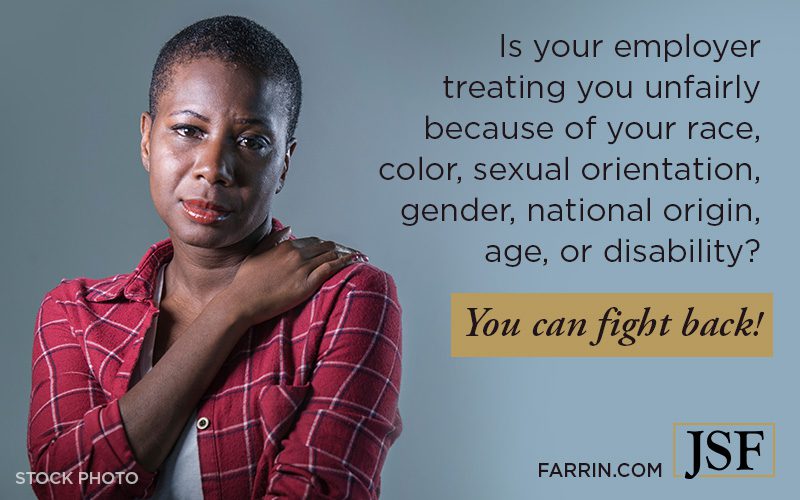Don’t let your employer treat you unfairly.
We can help you with your employment discrimination case.
Employment Discrimination Lawyers in North and South Carolina
Discrimination should not be tolerated anywhere – including at work. But it happens. Every day, employees are treated differently because of the color of their skin, their religious beliefs, their gender, where they come from, and other reasons. It’s not right, and you may be owed compensation.
If you believe you have been discriminated against in the workplace, we encourage you to seek assistance from an employment discrimination lawyer. Our firm has a long history of fighting for the rights of people who have been treated unfairly, and we can help you, too.
Note: Employment discrimination can affect both employees and job applicants.
We try to provide you the highest quality representation, to give you peace of mind and put you back in control. And our policy is to put you first. Always.
If you feel that your employer has discriminated against you, call us today at 1-866-900-7078 or contact us online for a free professional opinion on your case. There’s no obligation.
What Is Discrimination in the Workplace?
Employment discrimination generally occurs when an employer or supervisor treats an individual less favorably because of their race, color, religion, sexual orientation, gender identity, national origin, age, or disability.
Discrimination can occur in many areas of employment from employer interviewing practices and performance evaluations to compensation decisions and disciplinary actions.
Discrimination in the workplace can include:
- Hiring discrimination
- Disability discrimination
- Hostile work environments
- Wrongful termination
- Discrimination based on age, gender, or pregnancy
The Most Common Types of Hiring Discrimination
Some of the most frequent types of discrimination in the hiring process include rejecting qualified candidates because of their race (or sex or some other personal characteristic) and offering different groups of people different salaries for the same job.
Here are a few signs that a potential employer may be unfairly making hiring decisions:
- You are asked to take tests, such as math tests or physical lifting requirements, that are unrelated to the job (the employer may be screening out applicants from certain groups).
- The employer asks inappropriate questions during your interview or makes statements or assumptions based on stereotypes (they may be unfairly evaluating your ability to perform the job you’re interviewing for).
- The employer requires a pre-employment medical exam (they may be screening out applicants with disabilities).
If you feel that your job application was denied because of hiring discrimination, contact an experienced workplace discrimination attorney for clarity on your case at no cost and no obligation.
Examples of Disability Discrimination in the Workplace
Common examples of disability discrimination in the workplace can include:
- Failure to provide reasonable accommodations, such as wheelchair-accessible facilities and designated parking spaces
- Offensive jokes about a disability or need for special accommodations
- Denial of training opportunities because of your disability
- Policies that place employees with a disability at a disadvantage, such as short break times
- Retaliation after filing a workplace disability discrimination claim
Signs of a Hostile Work Environment
Discrimination in the workplace often results in a hostile work environment. Work practices and behaviors that single out and mistreat a person or group based on race, gender, age, pregnancy, or disability should never be tolerated.
Your work environment may be hostile if you experience certain behavior or observe the following signs:
- Sexual harassment, either verbal or non-verbal
- Offensive jokes or racial slurs
- Intimidation, bullying, or threats
- Behavior that excludes you
- Verbal aggression or attempts to humiliate you
- Co-workers who disadvantage or harm others to get ahead
These types of discriminatory behaviors can result in making workers feel discouraged, unmotivated, and unproductive – and they are often illegal.
If you observe these or other signs of workplace harassment at your job and believe you are being discriminated against, call an employment discrimination lawyer today for assistance.
What to Do if You Think You’ve Been Wrongfully Terminated
If you have been fired because of your race, gender, age, pregnancy, or disability, enlist the help of an employment discrimination lawyer to fight back because this is likely an example of wrongful termination.
Wrongful termination occurs when an employer fires an employee for reasons not related to their job or job performance.
To build your case, your attorney can help collect work records of your hours, wages, and performance evaluations, as well as gather relevant observations from your co-workers that may help support your claim.
Since both North and South Carolina are “at-will” states (which means that employers and employees can generally end the working relationship without giving notice or reason), having the help of an attorney to determine if you were fired unfairly can help you decide the best path for you going forward.
Other Ways Employees Are Unfairly Treated
When there is an imbalance of power in an employer-employee relationship, some employers may take advantage of the situation to treat certain workers unequally. You may have experienced one of the following forms of discrimination in your workplace if you can answer “yes” to these questions:
- Age Bias in the Workplace – Have you been passed over for a promotion because of your age? Do your co-workers or supervisors taunt you about being older? Have you noticed that only older employees are being laid off?
- Gender and Sex-Based Discrimination – Were you paid less than another worker of the opposite sex for doing the same job? Were you sexually harassed or assaulted?
- Pregnancy Discrimination – Were you fired or demoted once you announced your pregnancy? Were you denied your same job, or a similar job, when you returned from maternity leave?
Unfortunately, these types of workplace discrimination occur in every type of workplace. You do not have to accept this behavior. We can help you determine if you have a workplace discrimination case.
Contact the Employment Discrimination Legal Team at James Scott Farrin to Discuss Your Case
Call the Law Offices of James Scott Farrin at 1-866-900-7078 today to discuss your employment discrimination case or contact us online for a free professional opinion with no obligation.
Our team of North and South Carolina employment discrimination lawyers are passionate about protecting the rights of people who are trying to make an honest living. Our attorneys can help you understand how specific civil rights employment discrimination laws may apply to your situation and how to fight back against employers who may be trying to take advantage of you.
Employment Discrimination Laws Are Different in North and South Carolina
It’s important to discuss your case with an attorney who knows your state’s specific employment procedures and regulations and is familiar with your state’s Fair Employment Practices Agency (FEPA). This state organization works in conjunction with the U.S. Equal Employment Opportunity Commission (EEOC) to enforce state and federal anti-discrimination employment laws.
- A North Carolina employment lawyer will be familiar with the NC FEPA, which is the CRD-Employment Discrimination Section of the N.C. Office of Administrative Hearings. They could also be aware of a local employer’s history with employee grievances.
- A South Carolina employment lawyer will be well-informed about the Human Affairs Commission, which has its own set of regulations under the Human Affairs Law that address employment discrimination.
At James Scott Farrin, there’s no need to worry about whether you can afford an attorney. There are no up-front costs or hourly fees. And we won’t collect an attorney’s fee at all unless we recover for you. Guaranteed.2
We have a long history of fighting for the rights of people who have been treated unfairly, and we can help you, too. Nobody should have to endure discrimination at the workplace.




